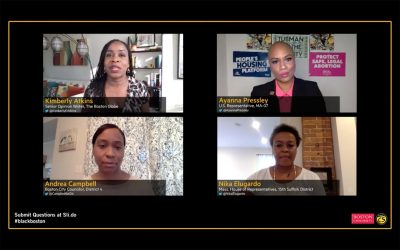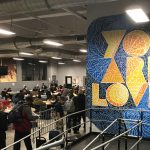COVID-19 has impacted communities across the country, but the virus has overwhelmingly affected families of color at disproportionately higher rates. As the general election approaches this November, how will these divisions in racial equality change politics?

To reflect on this question, the Boston University Initiative on Cities and BU Diversity and Inclusion partnered with WBUR’s CitySpace on Monday to host “Black Boston: Building Healthy Communities,” a virtual discussion featuring political figures in the city.
The most recent installation of the “Black Boston” series focused on the progress made by the Black community in Boston politics and the progress that has yet to be made, as well as how to support Black representation within politics.
The panel featured U.S. Rep. Ayanna Pressley, Massachusetts Rep. Nika Elugardo and Boston City Councilor Andrea Campbell. Kimberly Atkins of The Boston Globe served as moderator.
Initially discussing the obstacles faced in their election campaigns, Elugardo said she always had hope that an electoral win was possible.
“I didn’t feel like a David-and-a-Goliath situation at all. I felt like God called me to run for this specific office,” Elugardo said during the event. “It never occurred to me that I wouldn’t win.”
Elugardo defeated 10-year incumbent Jeffrey Sanchez in the 2018 Democratic primary for the 15th Suffolk District of Massachusetts. Elugardo said she grew up with an understanding of her power and that each individual has power that cannot be taken away.
Pressley was the first woman of color elected to the state’s House of Representatives, and represents Massachusetts’s 7th Congressional District.
Pressley said she was “very proud” of her congressional campaign, but felt that her path to success was paved by the people of color who came before her and made her seat in Congress possible.
“I really was the beneficiary of ground that had been laid,” Pressley said in the panel. “Oftentimes, when we talk about heroes and trailblazers and ancestors, they will make it this really abstract, iconic thing. But it’s actually … all around us, and we need to be saying thank you.”
But such progress and representation in politics is sometimes slow. Atkins said in an interview that it is “both a landmark and a shame” that no women of color had ever served the state’s House until 2018.
“The story of Black people in Boston is as old as Boston, and so having that representation is certainly important and there’s still a long way to go,” Atkins said. “There are a lot of barriers in place.”
Atkins said she believes voters in the Commonwealth are “savvy” and recognize the importance of diversity and representation in politics.
Katharine Lusk, executive director of BU’s Initiative on Cities, introduced the discussion. She said in an interview that though many people understand the need for diverse leadership, work still needs to be done.
“Deval Patrick, when he was governor, wasn’t the first person to say this, but he said, ‘Massachusetts, I was the first Black governor,’” Lusk said. “But it’s not enough to be the first, there has to be someone who comes after you.”
Campbell is the first Black woman to serve as Boston City Council President. During the panel, she said her campaign was about bringing a new perspective to her position.
“We need more of the unusual suspects to run for office,” Campbell said, “those who have never envisioned running for office, those who are doing meaningful work in our community, but want to take it to the next level.”
To contribute to more diversity in representation, Campbell said community members should help fund candidates and volunteer in campaigns.
For students looking to become involved in Boston politics, Campbell said the first step is acknowledging Boston’s racist faults.
“I take tremendous pride in being from here, but also pain, and recognize that that perception of us being an unwelcoming city, a racist city, is real for many,” Campbell said. “We have to name that and have honest and authentic conversations about that.”
Elugardo said during the panel that all young people have the power to create conversations in the way that no one else can.
“Use the time that you have to be in communities, shaping a narrative,” Elugardo said. “Justice is not charity. Justice is an investment in the future that we want.”














